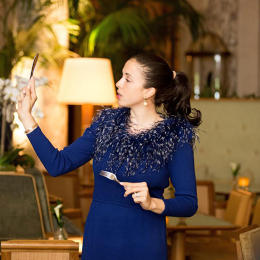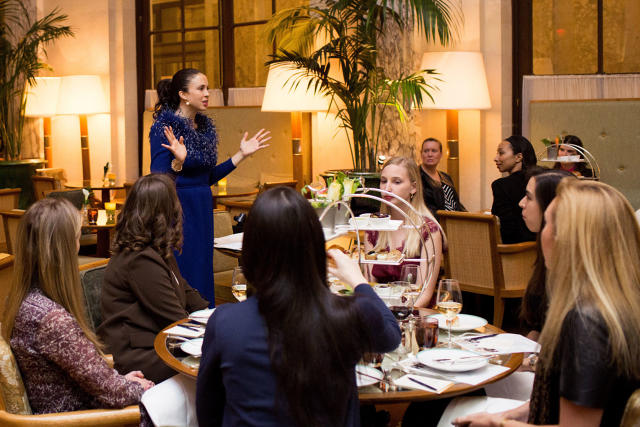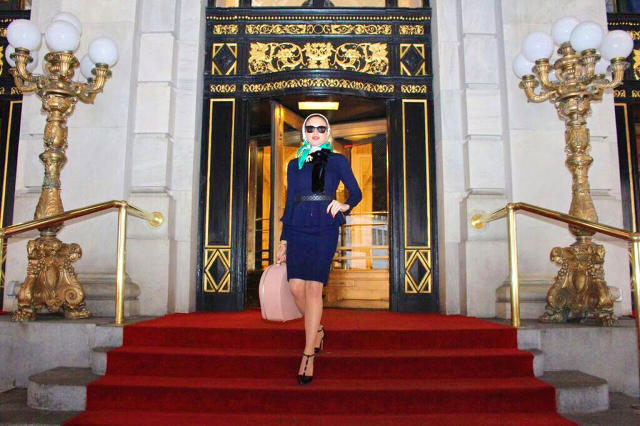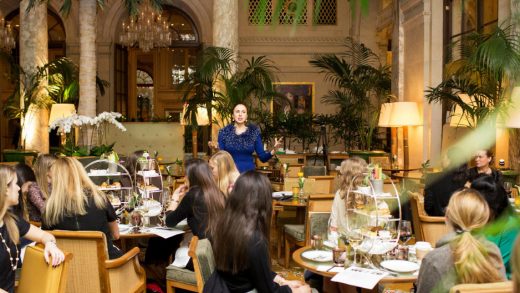Why The Plaza Hotel’s Business Etiquette Lessons Are Selling Out
I made several mistakes within my first minute.
My posture was poor (I leaned too far back in my chair), my leg crossing was incorrect (ladies cross at the ankles, not thighs), and I was not properly aligned to the dining table (you should be a hands-width away).
I did, however, pass the wardrobe test (thanks, J.Crew holiday sale), so I had that going for me.
I was having tea at The Plaza with Myka Meier, founder and director of the Beaumont Etiquette school. Meier has launched The Plaza Hotel Finishing Program with the iconic New York City hotel. It’s where business enthusiasts, mostly in their 20s and 30s, can go to learn manners.
Amid the high ceilings and gilded halls, students can take an hour-long course ($75) or five-hour-long intensives ($599). Class topics range from networking to dining and social interaction, all within continental etiquette standards. These are all things that some American millennials, raised in a rather casual culture, feel they’re lacking.

“The most important thing about etiquette, especially in business, is showing respect,” explains Meier. “It’s about being kind, thoughtful, and respectful to everyone around you.” Beaumont instructors will teach you how to shake hands (two pumps of the hand in business, three socially), introduce colleagues, tie a modern knot, navigate a wine menu, and even start a conversation (never, ever start with, “So what do you do?”).
They even have a whole bit on how to enhance eye contact, which is a “huge issue,” says Meier. “You need to connect with someone right from the beginning,” she stresses, “otherwise you’re not going to make the sale.”
Many enrolled in the program know the basics of etiquette but lack the certainty to fully execute on the spot. For example, one might feel pretty sure they know which fork to pick up during a specific meal course, but hesitate until they see someone else do so. Beaumont gives them the confidence to stop pausing.
It also gives them the tools to attract whatever it is they want in business—be it more clients, a higher position, or better rapport with colleagues. For that, they need charm. As Meier says, the most successful people are the most charming.
“You can learn charm,” promises Meier. “Charm is all about evoking positive emotion.”
While it all might sound a little old-fashioned, Meier is quick to point out that “this is not your grandmother’s etiquette class.” She gives it a modern spin infused with practical, relevant advice. Sprinkled within the courses are rules on how to email, whether or not to text emojis to your boss, and the best way to navigate your tech life according to the expectations of business leaders.

With digital life growing at an alarming speed, so too is modern etiquette evolving. In fact, as society loses more social interaction, one could argue etiquette becomes even more relevant. Text language is bleeding into email, personal lives are laid open on social media, and employees are tagging their superiors instead of engaging in conversation.
“The more time goes by, the more we’re relying on our devices,” notes Meier. “And the more we are used to working online, the less confident we are when we walk into a room to network.”
Meier sees a generation that has become more careless and lax in their business behavior. Uncouth. We might have more conference calls these days, “but you still need to be on time to a Skype call,” explains Meier. “It’s just as important.”
So far, the response from attendees has surpassed Meier’s expectations. The intensive workshops sold out within 24 hours, with a 60/40 split between women and men. A recent class had participants from all over the country—from California to Alabama—with 15% signed up for the entire series.
Meier partially credits the high interest in etiquette to the perception that Britain’s young royals have made it “cool again.” There’s also the popularity of shows such as Downton Abbey and Netflix’s The Crown, which portray aristocratic habits as chic and aspirational.
Students get more than just interactive feedback on how to change their business behavior. They also get the chance to network. Students repeatedly stick around to chat up their fellow students, grabbing drinks in the storied hotel lobby. “That has been huge,” remarks Meier.

Some clients are so inspired that they send their whole teams or departments for a refresher—or to be completely revamped. HR and law firms often request Meier send her instructors to teach a course in-house. They all, she says, realize business manners “can make or break your professional development.”
With such groups, instructors send around a box of anonymous questions that usually jump-start some enjoyable team building. Employees put anonymous “annoyances” into a box, which instructors address (attendees usually admit to being the cause of any which “annoyance”).
“It usually turns into a few good chuckles,” says Meier. “The whole point is to make them realize they will get a lot out of this course . . . It’s a safe environment, I’m not going to go back to your bosses!”
Meier was trained by a former member of the Royal Household of Her Majesty the Queen, and attended multiple finishing schools in England, Japan, and Switzerland. She worked in London at a global communications firm, in which she helped U.S. based-companies adjust to European modes of communication—basically, she taught them international etiquette. There she constantly dealt with corporate horror stories, like a prospect who went through the initial rounds of interviews but blew it after being dismissive of waiters at lunch (a glimpse at how they could treat their staff) or spitting food while speaking (a preview of a client’s experience).
After seven years, she finally decided to strike out on her own. In 2013, Meier launched Beaumont in London, followed by New York City in 2014. In New York, she continuously brought clients to The Plaza because she trusted their basics of etiquette. She was there so often that the partnership between The Plaza and Beaumont was an organic one. It was like she was already part of their establishment.
At first glance, it seems obvious—the new mom looks like the female embodiment of The Plaza: polished, charming, and perfectly dressed. There’s not one hair out of place. Meier, in essence, is like Eloise, if Eloise was forced to grow up and get a job. The young entrepreneur reasoned it was silly for Americans to fly overseas for etiquette training—they needed a stateside school. She saw the U.S. market specifically ripe for such an establishment because culturally, Americans haven’t valued etiquette as much as other countries.

“[Americans] are finally realizing how important it is,” she stressed, noting its place in international dealings. “It’s often the small details.”
In that sense, Beaumont can teach more than general international manners—instructors can create bespoke private classes to help you target a specific country. If you’re going to Switzerland, you should know how many times they kiss on the cheek, or where to place one’s wrists during business lunches. Such details vary country to country.
There are some, however, who might question the need for such a thing at a time when Alexa can answer everything. Can’t the internet provide this service? To that, says, Meier, tread carefully.
“Google can be a dangerous thing,” she warns. “You get a hundred different opinions.”
As Meier sees it, getting professional etiquette help no longer has a stigma attached, so you might as well trust the pros. In person, she says, instructors can observe you, mold you, and correct you.
In fact, etiquette has become so fashionable and necessary that it’s extended beyond the millennial market. Starting this spring, The Plaza will introduce Beaumont classes for children ages 5 to 17. There, the future of America will learn how to make eye contact, correctly refer to adults, and also, like the rest of us, learn to identify multiple forks at the dinner table.
Moving forward, Meier has big plans for Beaumont. The Plaza might be the perfect building to house her style of etiquette, but she has her eye on new outposts.
“We have gotten many requests to open in new cities,” she says, citing a specifically large number from California. “Etiquette is becoming trendy again.”
Indeed.
Fast Company , Read Full Story
(26)



